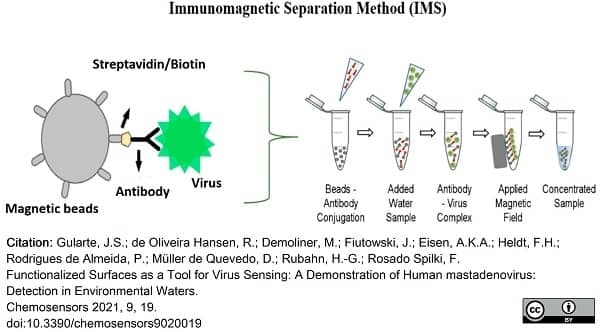Adenovirus antibody | B025 (AD51)

Mouse anti Adenovirus
- Product Type
- Monoclonal Antibody
- Clone
- B025 (AD51)
- Isotype
- IgG2a
- Specificity
- Adenovirus
| Mouse anti adenovirus antibody, clone B025 (AD51) recognizes all human adenoviruses serotypes. The most common infections caused by adenovirus are respiratory tract infections but some infections may also lead to conjunctivitis, skin-rash, diarrhea and bladder infections. Infant and children are most commonly affected by adenoviruses. Adenoviruses are icosahedral non-enveloped linear double-stranded DNA viruses. There are at least 51 serotypes, which are categorized into 6 species (A-F) based on molecular criteria. The virus capsid is composed of three different proteins: 12 fiber attachment proteins associated with 12 penton base proteins and 240 hexon proteins, which form the main capsid component (Ebner et al. 2005). Mouse anti adenovirus antibody, clone B025 (AD51) reacts with the adenovirus specific hexon polypeptide. Due to their infectivity to both quiescent and proliferating cells, adenoviruses have also been used as vectors in vaccination and in gene therapy (Thomas et al. 2002 and Abad et al. 2002). |
- Target Species
- Viral
- Product Form
- Purified IgG - liquid
- Preparation
- Purified IgG prepared by affinity chromatography on Protein A from tissue culture supernatant
- Buffer Solution
- Phosphate buffered saline
- Preservative Stabilisers
- <0.1% Sodium Azide (NaN3)
- Immunogen
- Adenovirus type 3.
- Purity
- >90% IgG content by SDS page
- Approx. Protein Concentrations
- IgG concentration 1.0 mg/ml
- Fusion Partners
- Spleen cells from immunised BALB/c mice were fused with cells of the JK.Ag8.653 mouse myeloma cell line.
- Regulatory
- For research purposes only
- Guarantee
- 12 months from date of despatch
Avoid repeated freezing and thawing as this may denature the antibody. Storage in frost-free freezers is not recommended.
| Application Name | Verified | Min Dilution | Max Dilution |
|---|---|---|---|
| ELISA | |||
| Immunohistology - Frozen | |||
| Immunohistology - Paraffin 1 |
- 1This product requires protein digestion pre-treatment of paraffin sections e.g. trypsin or pronase.
References for Adenovirus antibody
-
Maddox, A. et al. (1992) Adenovirus infection of the large bowel in HIV positive patients.
J Clin Pathol. 45 (8): 684-8. -
Blanshard, C. and Gazzard, B.G. (1995) Natural history and prognosis of diarrhoea of unknown cause in patients with acquired immunodeficiency syndrome (AIDS).
Gut. 36: 283-6. -
Blanshard, C. et al. (1996) Investigation of chronic diarrhoea in acquired immunodeficiency syndrome. A prospective study of 155 patients.
Gut. 39: 824-32. -
Thomas, P.D. et al. (2001) Enteric viral infections as a cause of diarrhoea in the acquired immunodeficiency syndrome.
HIV Med. 1: 19-24. -
Audu, R. et al. (2002) Isolation and identification of adenovirus recovered from the stool of children with diarrhoea in Lagos, Nigeria.
Afr J Health Sci. 9: 105-11. -
Abad, L.W. et al. (2002) Development of a biosensor-based method for detection and isotyping of antibody responses to adenoviral-based gene therapy vectors.
Anal Biochem. 2002 Nov 1;310(1):107-13. -
Thomas, C.E. et al. (2002) Adenovirus binding to the coxsackievirus and adenovirus receptor or integrins is not required to elicit brain inflammation but is necessary to transduce specific neural cell types.
J Virol. 76: 3452-60. -
Morfin, F. et al. (2005) In vitro susceptibility of adenovirus to antiviral drugs is species-dependent.
Antivir Ther. 10: 225-9.
View The Latest Product References
-
Griesche, N. et al. (2008) Growth characteristics of human adenoviruses on porcine cell lines.
Virology. 373: 400-10. -
Gularte, S.J. et al. (2021) Functionalized Surfaces as a Tool for Virus Sensing: A Demonstration of Human mastadenovirus Detection in Environmental Waters
Chemosensors. 9 (2): 19.
- RRID
- AB_321166
Please Note: All Products are "FOR RESEARCH PURPOSES ONLY"
View all Anti-Viral ProductsAlways be the first to know.
When we launch new products and resources to help you achieve more in the lab.
Yes, sign me up